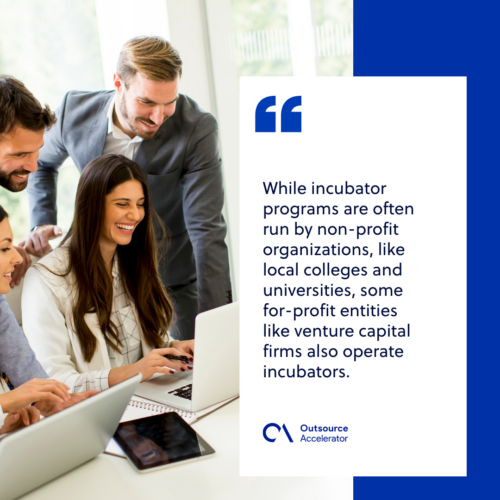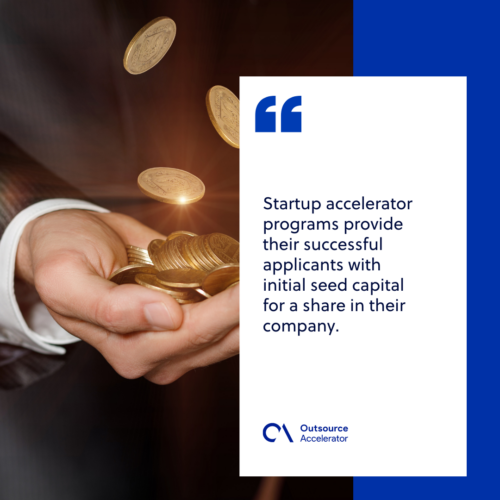Incubator vs. accelerator: Which is better for startups?

Getting your startup company up and running is no easy task. It can quickly become overwhelming due to the number of factors you’ll have to consider, such as the product or service to sell, the business model to use, and where to get your funding.
Fortunately, startup company owners have many options to turn to for business advice and even funding – it’s just a matter of choosing the right program for you.
However, deciding which funding program to get involved with, such as angel investors vs. venture capitalists or incubators vs. accelerators can be tedious and confusing.
In this article, you’ll know which one between incubator vs. accelerator is more appropriate for your startup business.
Incubator vs. accelerator: Incubator definition
Business incubators are special programs designed to help startup businesses succeed. These programs foster a startup’s growth by providing much-needed resources, such as a working space, equipment, and valuable advice.
While incubator programs are often run by non-profit organizations, like local colleges and universities, some for-profit entities like venture capital firms also operate incubators.

For-profit incubators give successful applicants access to initial seed capital for a percentage of their company equity.
Business incubators have existed as early as around the 1950s. The program has since undergone multiple evolutions before becoming what it is today.
Each incubator program may cater to only a specific industry, such as fashion, food, financial technology (FinTech), or education. However, some incubator programs are generalists and willing to enroll startups from any industry.
Incubator vs. accelerator: Accelerator definition
Like business incubators, accelerators also aim to help startups achieve success.
However, accelerator programs are more intensive than incubators and more meticulous in accepting applicants.
This boot camp-like program for startups provides successful applicants with coworking spaces, initial funding, other material resources they would need, and access to a network of already established professionals and owners of other fledgling companies.
Moreover, incubators also give access to seminars and workshops headed by successful startup owners.
Unlike incubators, which seldom invest in the businesses they “incubate,” startup accelerator programs provide their successful applicants with initial seed capital for a share in their company.

Compared to incubators, startup accelerator programs are relatively new. The world’s first accelerator, Y Combinator, was only founded in 2005.
Accelerators are also often run by existing companies and sometimes serve as the next step taken by startups who have “graduated” from incubator programs.
Incubator vs. accelerator: Which program is fit for you?
While incubators and accelerators both cater to startups and provide them with some necessary resources, the similarities between the two end there.
Fundamental differences set the two programs apart and make one more viable for certain startups than others.
If you want to know which one between an incubator vs. accelerator program is more appropriate for your startup, consider the factors below.
Timeframe
Incubators and accelerators operate on different timeframes.
As mentioned earlier, accelerator programs are more intensive and are like boot camps for startup companies.
Because accelerators aim to speed up a startup’s growth, these programs typically only last about three to six months. During this time, developments that would normally take a startup a couple of years to attain happens in months.
In contrast, incubators stay with successful applicants over a more extended period, typically one to two years.

Your startup’s development stage
Although both incubators and accelerators aid startup businesses, the two programs have differing entry stages during a startup’s development stage.
Incubators generally focus on startups in the early development stage and have yet to develop a definite business model.
On the other hand, accelerator programs only accept startups with at least a minimum viable product or MVP.

Capital needs
As discussed earlier, as non-profits run most incubators, they seldom ask for equity shares in exchange for their valuable help.
However, neither will they provide startups with capital investments.
On the contrary, it’s standard practice for accelerators to invest in their successful applicants and take a percentage of their equities.
Incubator and accelerator programs worldwide
Since the establishment of the first accelerator and incubator programs, many others soon sprung up across the globe.
Today, there are an estimated 7,000 incubator programs and more than 300 accelerators worldwide.
There are also outsourcing providers like Clark Staff that now offer startup incubation services.
Below are just a few of the world’s top incubator and accelerator programs.
500 Startups (Accelerator, US)
This flagship accelerator program of the San Francisco-based global venture capital firm runs for four months and gives startups access to the company’s vast resources.
Advanced Technology Development Center (ATDC) (Incubator, US)
Founded in 1980, ATDC has helped more than 130 companies and created millions of dollars in revenue. The tech hub has also raised over a billion dollars in outside financing.
Blenheim Chalcot/BrightBridge Ventures (Incubator, UK)
BrightBridge Ventures serves as Blenheim Chalcot’s FinTech incubation arm. Blenheim Chalcot boasts 17 years of experience in helping over 40 startups succeed.
Copenhagen Fintech (Accelerator, Denmark)
Despite being an accelerator program, Copenhagen Fintech was established as a non-profit organization by the Finansforbundet (Financial Services Union of Denmark), the City of Denmark, and the Finansradet (Danish Bankers Association).
Coin Apex (Incubator, US)
This New York-based incubator caters to startups in the software, cryptography, and technology industries. It strives to help the challenges faced by an interconnected global economy.
F10 Incubator and Accelerator (Accelerator/Incubator, Switzerland)
This accelerator cum incubator program is an innovation of Switzerland’s SIX. SIX is among the most technologically advanced stock exchanges globally.
Plug and Play Tech Center (Accelerator, worldwide)
This global accelerator program caters to several major industries, including AgTech, energy, FinTech, food and beverage, and health. Plug and Play Tech Center assists their startups and help them prepare their pitch to Silicon Valley investors.
TheFactory (Accelerator/Incubator, Norway)
Founded in 2016, this top Norwegian accelerator and incubator program caters to startups in the financial and real estate sectors. Since its inception, TheFactory has fast-tracked the growth of over 200 companies and nurtured more than 45.
Venture Catalysts (Incubator, India)
Venture Catalyst is the largest incubator not just in India but in the whole Asian region. It is also India’s first integrated incubator and caters to startups from various industries, such as FinTech, Saas, food and beverages, health tech, and insurtech.
Y Combinator (Accelerator, US)
Widely regarded as the top accelerator program globally, Y combinator has spurred the success of such household names as Airbnb, Dropbox, Reddit, Twitch, and Instacart.







 Independent
Independent




